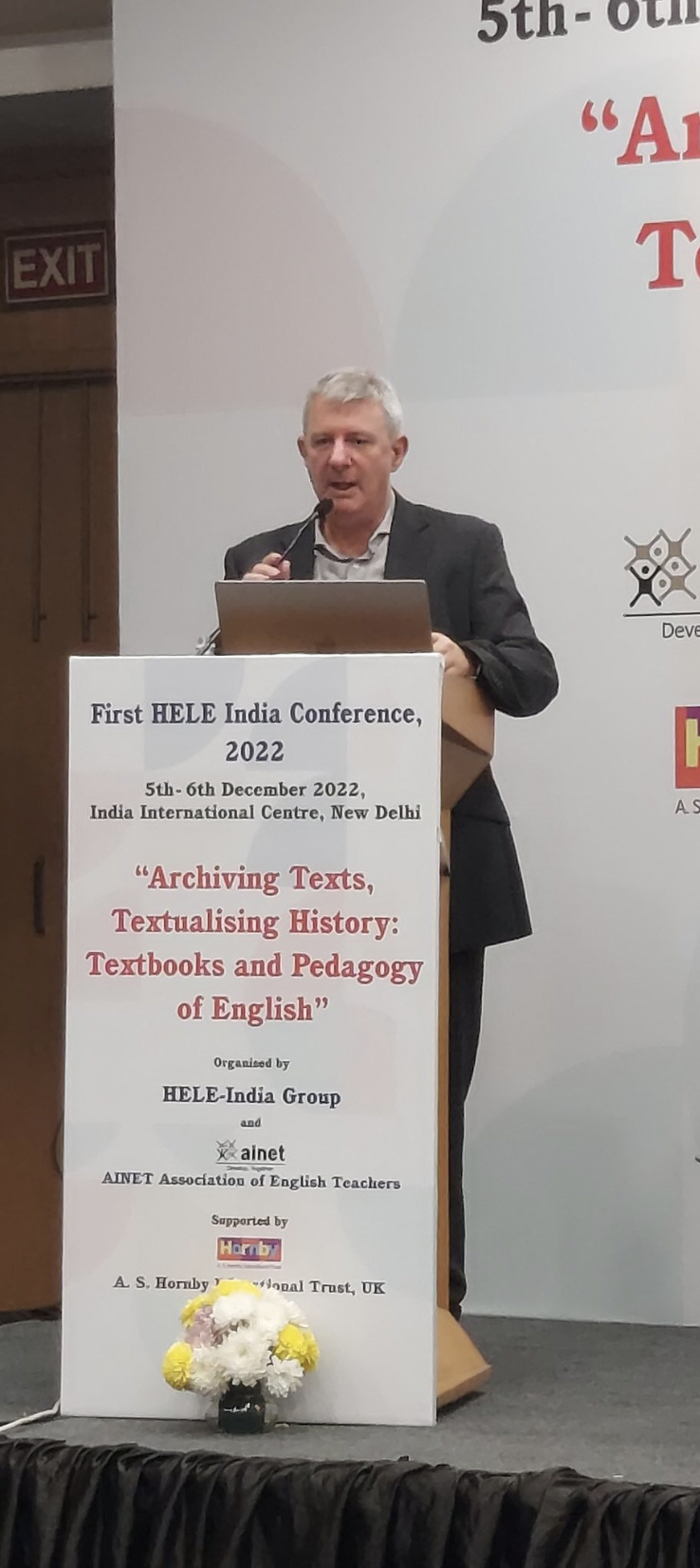Opening plenary - First HELE India Conference, New Delhi - 'Historiographical methods in English Language Education'
Professor Richard Smith, University of Warwick
(5 December, 2022)
Abstract
In this talk, I focus on how to develop a useful archive of sources and on how to use them for historical research, based on my experience of founding and developing the Warwick ELT Archive since 2002. I focus particularly on needs to consult primary sources, detailing the types of source which can be useful for different kinds of historical research and indicating how sources can be exploited. Here, I refer to the idea of ‘layers’ of language learning and teaching, emphasizing that, while histories of theory have been common in the past, well-contextualized histories of practice can be equally or more useful.
Plan
I. Foundations
- Why history?
- The scope / identity of HELE (India)
- A proposed focus on context & practice – neglected ‘layers’
- A set of general research questions
II. Historiographical (i.e. historical research) methods in HELE
- Overall process (steps to take) in a historical research project
- Primary not just secondary sources
- Developing a corpus / Establishing an ‘archive’
III. Some illustrations from Indian HELE
PowerPoint slides here
References and links
1. Foundations & 2. Historiographical methods in HELE
'Building "Applied Linguistic Historiography": Rationale, scope and methods', by Richard Smith (2016). Applied Linguistics 37/1: 71-87. Online (Open Access).
'History of language teaching and applied linguistics' by Richard Smith (2021), in Coombe, C. & Mohebbi, H. (eds.) Research Questions in Language Education and Applied Linguistics: A Reference Guide. Springer, 743–747.
Cuban, Larry, The multi‐layered curriculum: Why change is often confused with Reform (accessed 05/10/21).
Doff, S. & Smith, R. (Eds.) Policy and Practices in Language Learning and Teaching: 20th-Century Historical Perspectives. Amsterdam University Press. Introduction (pre-publication version) available here.
3. Some illustrations from Indian HELE
Some primary sources:
Horace Wyatt (1923) The Teaching of English in India. London: Oxford University Press, in Teaching English as a Foreign Language, 1912-1936: Pioneers of ELT, vol. 1, edited by Richard Smith (2003). London: Routledge
Michael West (1960) Teaching English in Difficult Circumstances. Published by Longmans (1960), in Teaching English as a Foreign Language, 1936–1961: Foundations of ELT, vol. 6, edited by Richard C. Smith (2005). Abingdon: Routledge.
Manuscript by Lionel Billows relating to the 'Madras Snowball', in Warwick ELT Archive
Some secondary sources:
‘Bilingual English teaching in colonial India: the case of John Murdoch’s work in Madras Presidency, 1855–1875’, co-authored by R. Smith & R. Vennela (2019). Language & History 62(2), 96-118. Corrected pre-publication version here.
Smith, R. & Vennela, R. ‘Countering some myths around Macaulay’s Minute and English linguistic imperialism in 19th-century Indian education’. Paper at the 7th International Conference on Late Modern English, University of Catania, Ragusa, Italy, May 2022.
Foreigners and Foreign Languages in India: A Sociolinguistic History by Shreesh Chaudhary (2009). Delhi: Foundation Books
Language Policy and Education in India: Documents, Contexts and Debates, co-edited by M. Sridhar and Sunita Mishra (2017). Abingdon: Routledge.
'ELT and the British Council (1934–2014): Research notes' by Richard Smith (2015).
A History of English Language Teaching by A.P.R. Howatt. Published by Oxford University Press in 1984 / 2004 (2nd edition, with H.G. Widdowson).

Presenter biodata
Dr Richard Smith is a Professor of ELT and Applied Linguistics at the University of Warwick. He is known for his work supporting teachers of English in public education systems in Global South contexts, through his work as founder and coordinator of the Teaching English in Large Classes network and his work to support teachers and mentors with their own exploratory action research.
He has collaborated with colleagues in India for a number of years, firstly in co-leading the British Council’s Survey of Indian ELT Research together with Professor Paul Gunashekar of EFL-University, in -co-leading a British Council scheme for researchers in India with Professor Rama Mathew and as co-leader with Professor Amol Padwad of the Action Research Mentoring Scheme – known as ‘ARMS’ - in its first year. More recently he has been collaborating with the HELE-India research group in its Hornby Trust supported project to document the history of English language education in India.
In 2002 Richard founded the Warwick ELT Archive – which is a unique historical collection of documents, textbooks and recordings relating to the history of English language teaching. In 2015 he founded HoLLTnet, an international Research Network on History of Language Learning and Teaching within AILA, the International Association of Applied Linguistics. Via this work and via his publications he is a leading figure in recent moves to place ELT and language teaching more generally on a more solid historical foundation. For more information, see homepage.
]

